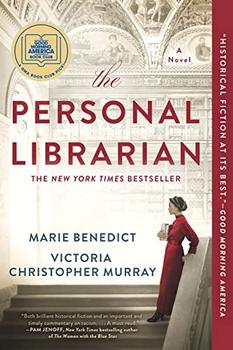Summary | Excerpt | Reading Guide | Reviews | Beyond the Book | Readalikes | Genres & Themes | Author Bio

Before she exits the office altogether, she turns back to me, whispering, "Are you still free for the philosophy lecture tonight?"
Since Woodrow Wilson assumed the presidency of Princeton University three years ago and instituted all sorts of scholastic reform, the number of lectures open to staff and members of the community has increased. While Gertrude and I revel in being included in the academic life of the campus, I loathe certain of Wilson's other decisions, such as maintaining Princeton as a whites-only university when all the other Ivy League schools have admitted colored folks. But I would never voice aloud these views.
Instead, I say, "Wouldn't miss it for the world."
* * *
The quiet of the stacks wraps around me like a soft blanket. I relax into the subdued hush of patrons turning pages and the scent of leather bindings. My long days spent in the company of medieval manuscripts and early printed books calm and delight me. Imagining the labors of the first printing press users as they memorialized the English language and broadly disseminated its literature through the meticulous work of placing the type letter by letter, transforming empty pages into beautiful text to inspire worshippers and readers, transports me beyond the limitations of this time and place, just as Papa always believed. To him, the written word could act as an invitation to free thought and the broader world, and nowhere was that more true than in the dawn of the printed word, where—for the first time—that invitation could be made to the masses instead of a select few.
"Miss Greene." I hear a soft voice from beyond the stacks.
Two simple words, but my visitor's modulated tone and distinctive accent give him away, and anyway, I've been waiting for him.
"Good day, Mr. Morgan," I reply, turning in his direction.
Even though I'm talking softly, Miss Scott glances up from the circulation desk with a disapproving scowl. It isn't so much the volume of my speech as the pleasantness of my relationship with the fellow librarian and collection benefactor that vexes her.
While Mr. Junius Morgan is ostensibly a banker, he has generously donated dozens of ancient and medieval manuscripts to the university, which is why he also holds the titular position of associate head librarian. I'm convinced that Miss Scott thinks any sort of relationship between us—even the cordial, professional one we share—is beneath him.
A slight man, with wispy brown hair and a kindly expression behind his circular glasses, materializes. "How are you today, Miss Greene?"
"Well, sir. And yourself?" My tone is professional and reserved. He's twenty minutes later than the time we'd mentioned, and I'd begun to think he'd forgotten about our appointment. But I would never dare mention his tardiness.
"I was going to take a gander at the Virgils, as we discussed yesterday. I wonder if you'd still care to accompany me. Assuming your duties and your interest permit, of course."
Mr. Morgan, whom I think of as Junius in the privacy of my thoughts, knows that my zeal for the library's most valuable collection is nearly as intense as his own and that none of my other tasks will stand in the way of the private viewing he has promised.
We share a passion for the ancient Roman poet Virgil. The library houses fifty-two volumes of his poetry. My discussions with Junius about the dark voyages in The Aeneid and The Odyssey are some of the brightest moments in my days. While Junius admires Odysseus, I identify always with Aeneas, the Trojan refugee who desperately tries to fulfill his destiny in a world that holds no place for him. Aeneas was driven by duty, sacrificing for the good of others.
"I have cleared my schedule, sir." I smile.
"Wonderful. If you'll follow me."
My skirts swish the oak floor as I follow Junius to the small, elegant room where the Virgils are housed. I have to inhale and restrain my foot from tapping as I wait for him to fish out a heavy key ring from his pocket.
Excerpted from The Personal Librarian by Marie Benedict and Victoria Christopher Murray. Copyright © 2021 by Marie Benedict. All rights reserved. No part of this excerpt may be reproduced or reprinted without permission in writing from the publisher.
Flaming enthusiasm, backed up by horse sense and persistence, is the quality that most frequently makes for ...
Click Here to find out who said this, as well as discovering other famous literary quotes!
Your guide toexceptional books
BookBrowse seeks out and recommends the best in contemporary fiction and nonfiction—books that not only engage and entertain but also deepen our understanding of ourselves and the world around us.